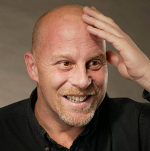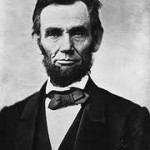first drafts
GREAT SPEECHES
IN HISTORY
Ah, to say just the right phrase. To string together in concise fashion the perfect mix of sentiment and meaning–to galvanize the assembled masses. I’m sure all of us at one time have asked “Where are the great orators today?” I know a guy who sleeps outside my building who was asking that just last night. In addition he asked if I could help him out with a little change, because he fought in ‘Nam and still hears the choppers sometimes at night and that Charlie killed his best friend.
My point is, who among our so-called ‘leaders’ has the power to inspire us with their words, to coin the phrases that will strengthen us in battle and comfort us in tragedy? President Obama gives a great speech, but even his most stirring words had to start with a first draft.
Now, a recently discovered collection of these early manuscripts has been made public, and we can see that even our most treasured orations went through a little…tinkering.
 During the Revolutionary War, and facing certain death for treason against the British Empire, it turns out Patrick Henry initially muttered
During the Revolutionary War, and facing certain death for treason against the British Empire, it turns out Patrick Henry initially muttered
“Look, you don’t have to kill me.
I like the King–this whole ‘United States’ idea is just a big misunderstanding”–and I can take you to Jefferson–he’s the main guy behind this anyway.”
Few people know that Abraham Lincoln agonized for hours before his great speech, and that the original ending was to have been
“I realize that it won’t matter what I say here, since most of the people here are DEAD. God, I hate this job.”
Civil rights leader Reverend Martin Luther King foretold in lofty metaphor a vision of a country united across racial divides. However, in an early manuscript, Dr. King, worried about instigating violence, intended to begin with the somewhat less inspirational
“I have…what seems to be, at least in my mind–what might be a pretty good idea–at least give it some thought.”
The immortal question posed by JFK in January of 1960 inspired an entire generation. But what we remember as “Ask not what your country can do for you…” actually began as
“Don’t ask me what to do. I’m not sure we really have to do anything. It’s not like we’re at war”
And baseball great Lou Gehrig, addressing the Yankee Stadium faithful, brought tears to a generation with his humility and strength in the face of tragedy. But it turns out, in an early draft of his speech, he actually planned to say:
 Today…I consider myself…to have really been screwed over here. I mean…c’mon, people, I’m a professional athlete, and now they’re telling me I’ve got an incurable neurological disease—AND you’re planning on naming it after me? There are luckier people I can think of.”
Today…I consider myself…to have really been screwed over here. I mean…c’mon, people, I’m a professional athlete, and now they’re telling me I’ve got an incurable neurological disease—AND you’re planning on naming it after me? There are luckier people I can think of.”



